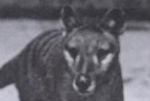A 9 second video released today on YouTube claims to show a living Tasmanian tiger. The footage was captured by Murray McAllister last year. McAllister says he has seen the believed-to-be-extinct Tasmanian tiger several times in the last few years.
While the full video is over 8 minutes long, McAllister has only released a preview. He is negotiating for television rights.
According to his website, McAllister has seen Tasmanian tigers both on the island of Tasmania and on mainland Australia even though it is believed the Tasmanian tiger was largely extinct in Australia before Europeans arrived.
The Tasmanian tiger, or thylacine, has captured the imagination of cryptozoologists ever since the last known individual died in the 1936 in the Hobart Zoo, which closed the next year.
There have been thousands of persistent sightings of the thylacine throughout Tasmania since the 1930s, including inconclusive photos taken by German tourists in 2005.
Once the world’s largest carnivorous marsupial and a top predator, the Tasmanian tiger, if extinct, was likely done in by human persecution, disease, and competition with the non-native dingo.
Update: According to Our Amazing Planet, experts have stated that the animal in the video is a red fox, not a Tasmanian tiger. DNA analysis by researchers from McAllister confirmed that the animals is a red fox, a non-native species to Australia.
Related articles
Time to give up on Tasmanian tiger, says DNA expert

(03/02/2009) Money and energy spent on finding the Tasmanian tiger should be used for other conservation purposes, according to Dr. Jeremy Austin from the University of Adelaide’s Centre for Ancient DNA. The Tasmanian tiger, or Thylacine, has captured the imagination of cryptozoologists ever since the last known individual died in the 1936 in the Hobart Zoo, which closed the next year. There have been several unreported sightings throughout the island since the 1930s, including inconclusive photos taken by German tourists.